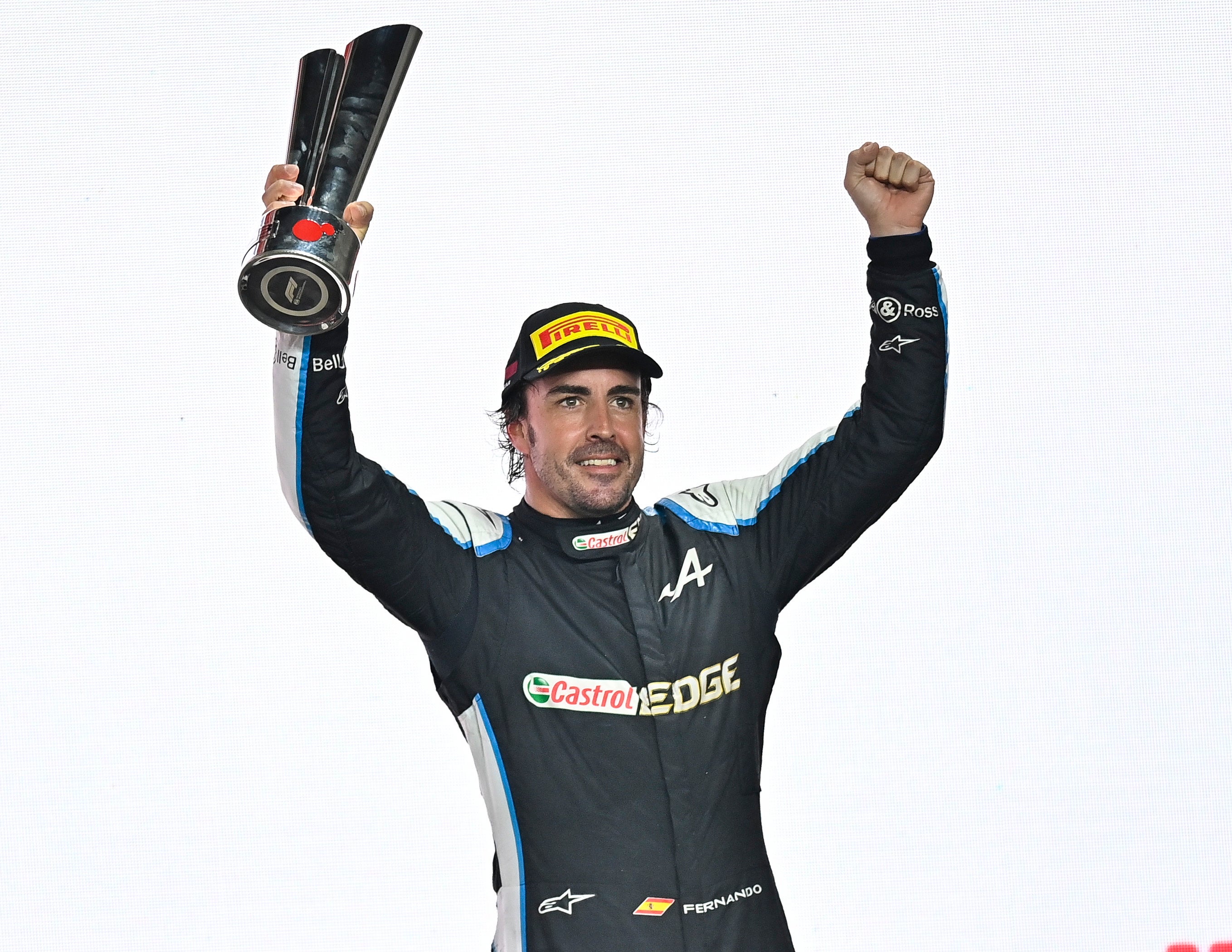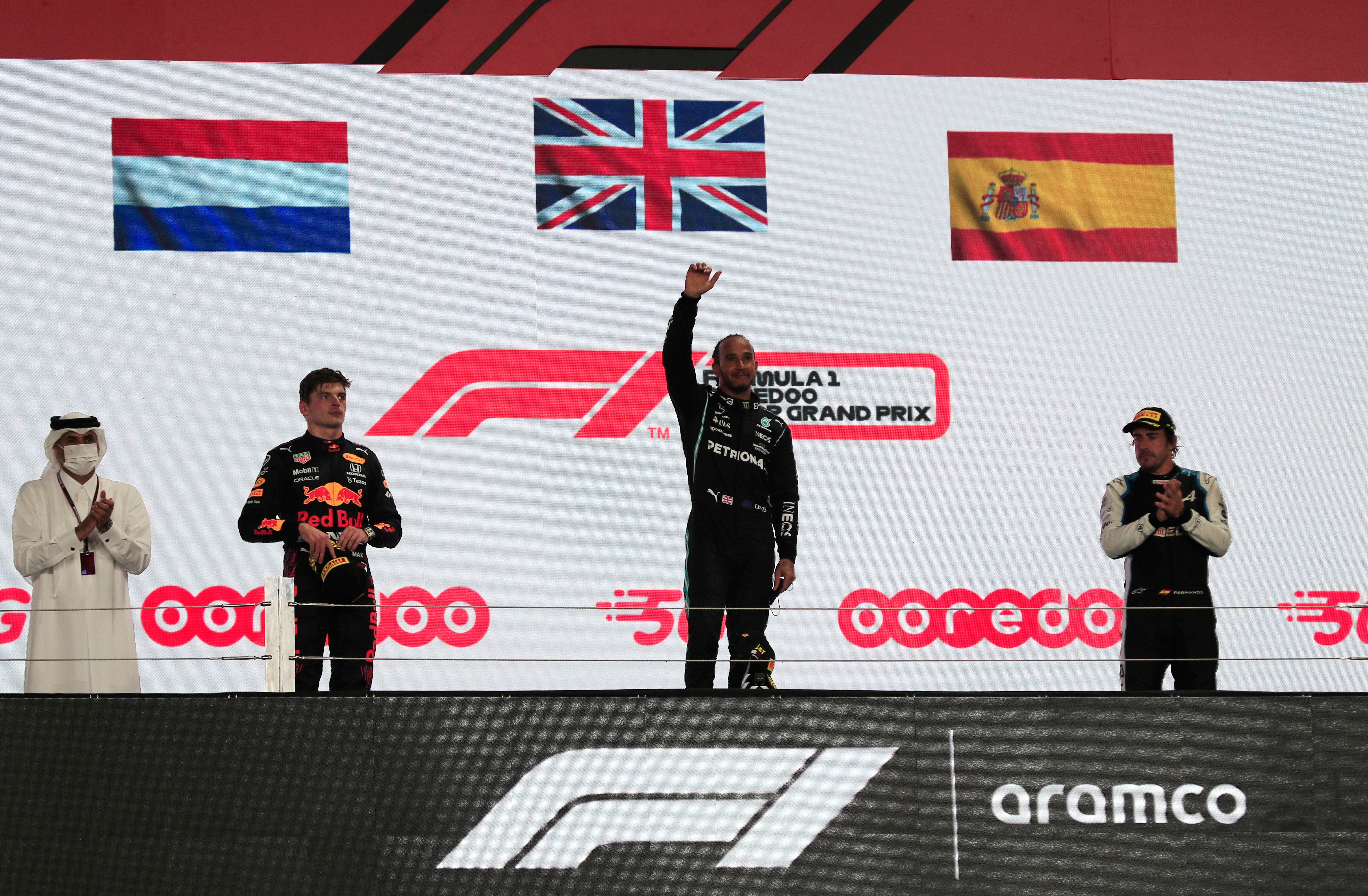Fernando Alonso offers precious reminder of class of old with Qatar Grand Prix podium
The Spaniard rolled back the years at the Losail International Circuit with a first podium in seven years

Your support helps us to tell the story
From reproductive rights to climate change to Big Tech, The Independent is on the ground when the story is developing. Whether it's investigating the financials of Elon Musk's pro-Trump PAC or producing our latest documentary, 'The A Word', which shines a light on the American women fighting for reproductive rights, we know how important it is to parse out the facts from the messaging.
At such a critical moment in US history, we need reporters on the ground. Your donation allows us to keep sending journalists to speak to both sides of the story.
The Independent is trusted by Americans across the entire political spectrum. And unlike many other quality news outlets, we choose not to lock Americans out of our reporting and analysis with paywalls. We believe quality journalism should be available to everyone, paid for by those who can afford it.
Your support makes all the difference.“Olé! Ole!” bellowed Fernando Alonso over the Alpine team radio as he crossed the line to take third-place at the inaugural Qatar Grand Prix on Sunday afternoon.
The 40-year-old drove a fast, reliable race at the Losail International Circuit race as he held off challenges from Pierre Gasly, Lando Norris and Sergio Perez to secure a first Formula 1 podium since he finished second at the Hungarian GP for Ferrari at the beginning of the turbo-hybrid era in 2014.
Since returning from a two-year sabbatical to drive for Alpine at the beginning of this campaign, Alonso has delivered a series of consistent, smart drives which have maximised results in a midfield car which excels at some race tracks and toils badly at others.
The Spaniard made clear that he was returning to the top level of single-seater motorsport in order to challenge for podiums and race victories, and ultimately to try and add to the two world championships he won with Renault (the team now running as Alpine) when he usurped Michael Schumacher back in 2005 and 2006.
That had not quite been possible until F1 travelled to Qatar for the first time in its history this weekend, with a combination of an impressive qualifying session and grid penalties for Max Verstappen and Valtteri Bottas giving Alonso the best opportunity since his return. He delivered, first overtaking Gasly for P2 off the start with a patient, controlled move capitalising on his superior traction out of turn two, before building a gap to rival cars behind and expertly managing a one-stop strategy which plenty of others either refused to gamble on or paid the price for handling poorly with tyre punctures.
Alonso’s status as a double world champion means he enjoys vast support from not just his homeland but all around the world, and his joy in the aftermath of this result will have been matched by millions who have followed the peaks of troughs of his illustrious but complicated and occasionally volatile career.
“Obviously the win is the win, so [a podium] cannot rank too high,” he explained to Sky Sports afterwards. “But this is like... finally!”
The relief in Alonso’s voice was palpable. This is a driver who is unquestionably one of the most talented and naturally quick that the sport has ever seen, but whose tally of two championships feels like a low return, owing to a series of poor career decisions and strained relationships with senior figures in the Formula One paddock.
Alonso spent the years from 2007 to 2018 in cars which ranged from relatively fast but not the quickest – the Ferraris he drove between 2010 and 2012 – to downright broken and borderline impossible to complete races in – the 2015 McLaren in which he retired from five of his first seven races. His sensational return to the sport was unexpected, as was the speed with which he readjusted to the intensity and physical strain of driving the fastest racing machinery on the planet.
In Qatar, Alonso became only the third driver in his 40s to step onto the Formula One podium. But an age stat isn’t important. What matters is that he is an athlete who has abided across eras, one of those perennial super humans who defines how sports fans view and experience time itself.

Any sports fan reading this will identify with the hollowness, that punch in the gut when it feels like time is suddenly fast-forwarding at breakneck speed via sport, in some way. Maybe you felt it when your childhood football idol became a manager, or a boxer you lived every single punch alongside retired in a heap on the canvas, or a tennis player with all the panache and guile in the world could simply no longer move around the court anymore.
Athletes who persist, those who win often enough, and whose media caricature forms part of a decades-spanning storyline, captivate us in a way that means that when they are gone, or when they start to wane at least, a part of us drifts away with them too. It is chastening, and has the power to make you consider and appreciate your own ageing and mortality like precious little else.
Of course, there is a production line of sporting talent and marketing machinery which makes sure the old champions are replaced by shiny new ones immediately. And jumping on board early, following the very beginnings of the careers of young people like tennis star Emma Raducanu or McLaren driver Norris, is a marvellous adventure in itself.
But when one of the old guard is still delivering the goods, you get to hold on to a piece of your younger yourself for that touch longer. A bit of the innocence, the thrill, and the timelessness of being a besotted sports fan.
So, let’s hope Alonso can keep olé-ing himself across the finish line for a good while longer, for the sake of our youth as much as his own.
Join our commenting forum
Join thought-provoking conversations, follow other Independent readers and see their replies
Comments